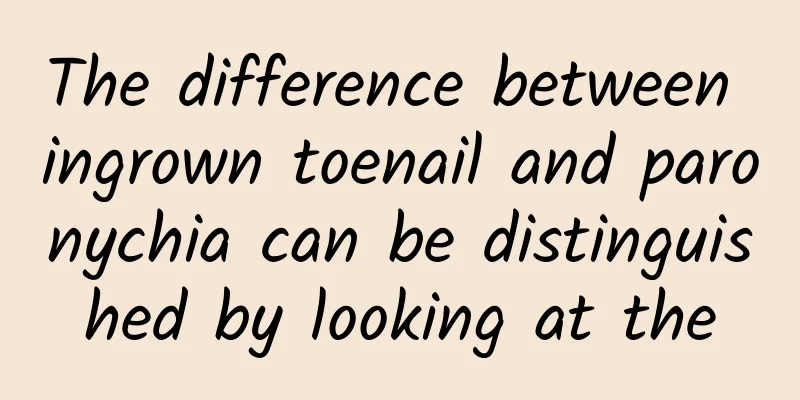The difference between ingrown toenail and paronychia can be distinguished by looking at the

|
Many people think that ingrown toenails and paronychia are very similar, so they think that these two are basically the same disease. In fact, the causes and symptoms of ingrown toenails and paronychia are different, and even the treatment methods are different. 1. Because of the gaps in the nail groove , pathogenic bacteria can easily lodge and reproduce in the nail groove, especially on the feet, which is a perfect place for pathogenic bacteria to grow. Most long-term paronychia is caused by the growth of the toenail into the flesh, and in a few people it may be caused by fungal infection. 2. Paronychia is an inflammation on both sides of the nail caused by bacterial infection, and also has symptoms such as pain, swelling, and suppuration. It is mostly caused by minor trauma such as punctures and peeling, but more often it is caused by ingrown toenails. The edge of the ingrown toenail irritates the soft tissue of the nail groove and causes secondary infection. Most of the time, it occurs on the inner edge of the big toe. Initially, there is slight pain on one side of the nail, with local redness, swelling and tenderness. The infection can gradually spread to the nail root and the opposite nail groove, or even under the entire nail plate, forming perionychia or subungual abscess, and may also be accompanied by hyperplasia of granulation tissue in the nail groove, with obvious pain and tenderness, and even inability to walk. 3. Ingrown toenail is a foot disease in which the toenail pierces the soft tissue and repeatedly squeezes the toe, causing symptoms such as toe pain, swelling, and suppuration. Ingrown toenails are often caused by wearing shoes that are too tight, bending and deforming one side of the toenail. It occurs when the side edge of the toenail pierces the soft tissue of the nail groove. Toenail deformities can also be caused by squeezing, collision, mechanical damage or certain diseases. Toenails can also be trimmed too short and too deep, and the side edge of the nail is not trimmed neatly, which can also cause ingrown toenails. Ingrown toenails cause great pain to patients, especially when walking or when the toenails are squeezed, the pain is aggravated. In severe cases, patients will be restless and will feel pain when covered by a quilt while sleeping. Moreover, ingrown toenails are very prone to repeated infection, causing redness, swelling and pain in the nail groove, and even infection and suppuration. The above is the difference between paronychia and ingrown toenails in terms of causes and symptoms. While there are differences between the two, there is also a certain correlation. Suffering from ingrown toenails is often prone to paronychia. Repeated paronychia can cause deformation of the nails and form ingrown toenails. The two diseases complement each other and can be transformed into each other. Both diseases are common and frequently occurring clinical diseases. Chronic paronychia that does not heal for a long time is often seen on the inner and outer sides of the first toe. |
<<: What to do if your stool is dry and bleeding? Find the cause and prescribe the right medicine
>>: What is the difference between rhinitis and sinusitis?
Recommend
How to eat Gorgon fruit to nourish the kidneys, an old Chinese doctor teaches you how to eat Gorgon fruit to nourish the kidneys
Gorgon fruit is a commonly used traditional Chine...
If a woman suddenly shows this abnormality, she must be sick!
Compared to strong men, girls should pay more att...
How to relieve cold headache immediately
Colds and headaches are very common. When you hav...
Why do I sweat when I cough?
Sweating when coughing is quite common in daily l...
Stomach pain and loose stools
If you have stomach pain and unformed stools, you...
Vaginal itching during confinement
Every mother pays more attention to her physical ...
What is the best medicine for rheumatism?
Rheumatoid arthritis should be treated with medic...
How to treat weak spleen and stomach? A recipe for regulating the spleen and stomach.
The spleen has the functions of transporting nutr...
How to read Ganoderma lucidum spore powder
How to identify Ganoderma lucidum spore powder? I...
What is the fastest cure for tinea pedis? Chinese medicine prescriptions for treating serious diseases
Tinea pedis is an extremely common skin disease. ...
How to cure stomach fire
Symptoms of stomach fire Gastrointestinal symptom...
Symptoms of a cold stomach in newborns
For a newborn, the mother can take very careful c...
Can I eat fish after double eyelid surgery?
After double eyelid surgery, you should pay atten...
Double eyelid repair
Many women are particularly envious of girls with...
Pain when pressing on the outer side of the breast under the arm
For women, if pressing the outer side of the brea...









